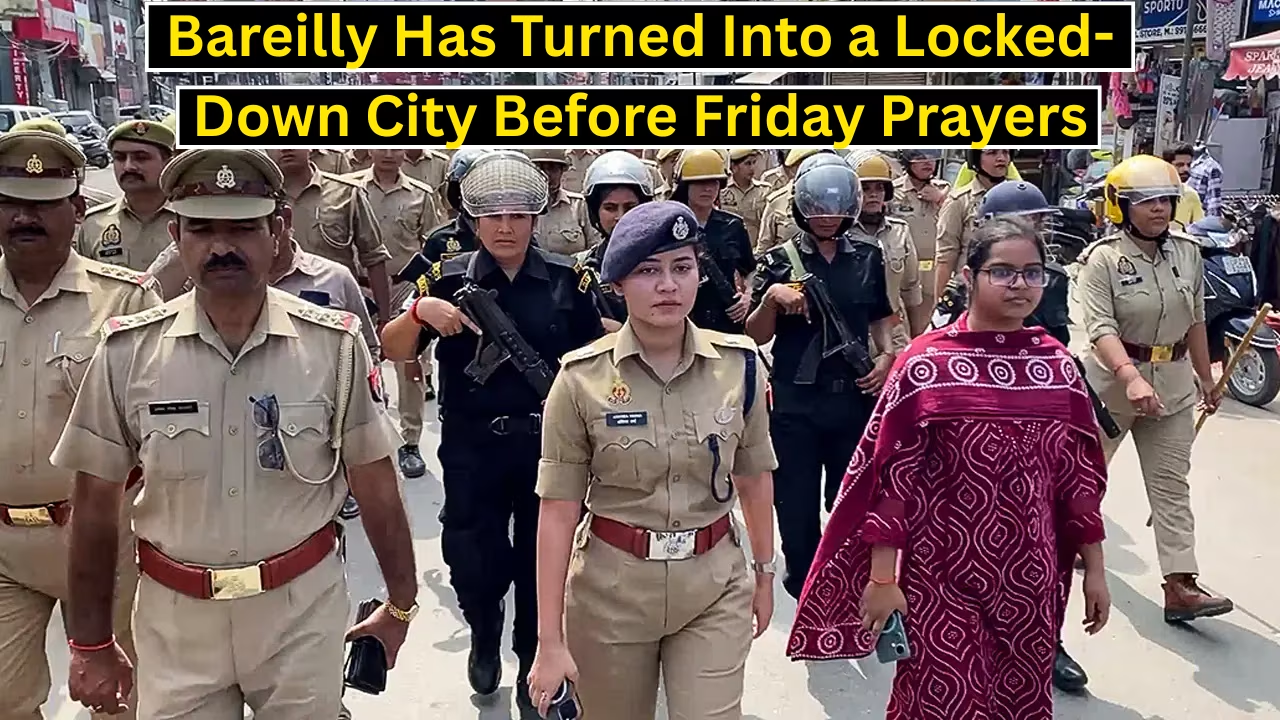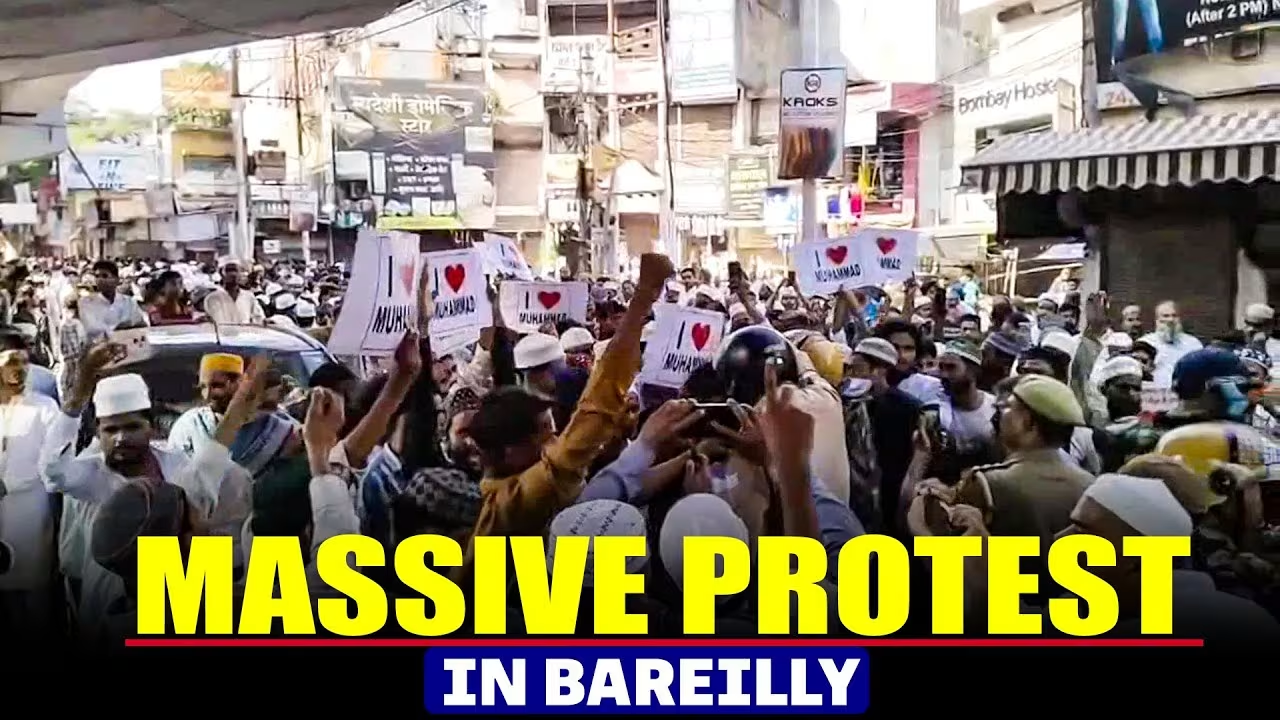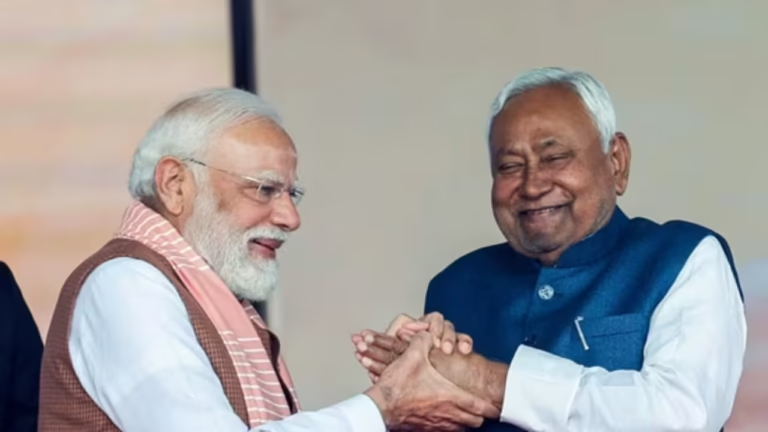
Security forces patrol Bareilly as the city faces a 48-hour internet blackout following the ‘I Love Muhammad’ controversy.
Published on: October 3, 2025 at 16:02

The city of Bareilly in Uttar Pradesh has been on edge this week, with internet services suspended for 48 hours, heavy security on the streets, and drones in the skies. The reason: a growing controversy over “I Love Muhammad” posters, which spiraled into protests, clashes, and fears of communal unrest. With thousands of security personnel deployed and citizens forced offline, Bareilly has become a case study in how fragile peace can be when faith, politics, and law enforcement collide.
The Spark That Ignited Tensions: How Posters Became a Flashpoint
The issue began when “I Love Muhammad” posters appeared in parts of Bareilly. What may have been intended as an expression of devotion quickly turned into a political and communal flashpoint. Local groups complained, leading to heightened tensions before Friday prayers.
When cleric Tauqeer Raza Khan initially called for a protest but later withdrew, it left many followers angered. Post-prayer gatherings escalated, with some groups clashing with the police. Reports suggest over 2,000 people were involved in demonstrations, leading to 8 arrests, 31 detentions, and multiple FIRs. Several parts of Bareilly even reported stone-pelting and firing incidents.
For residents, the experience has been unsettling. What started as posters turned into a full-blown law-and-order crisis, leaving ordinary people caught in the crossfire of faith and politics.
Security Blanket: Internet Ban, Drones, and Flag Marches
To control the situation, authorities took some of the strictest preventive steps in recent memory:
-
48-Hour Internet Shutdown: Mobile data, broadband, and SMS services were cut off to prevent rumors and provocative videos from spreading. While officials argued it was necessary for peace, many citizens felt it also cut them off from vital communication.
-
Massive Deployment: Nearly 8,000 personnel from the police, PAC, and RAF were deployed across Bareilly. Sensitive areas were declared “super zones” and “special zones” to tighten monitoring.
-
Aerial Surveillance: Drones hovered over the city, capturing real-time visuals of gatherings and helping security forces respond instantly.
-
Flag Marches & Appeals for Calm: Senior officers marched in tense neighborhoods, while clerics from the Ala Hazrat Dargah urged worshippers to pray peacefully and return home.
The city, in many ways, resembled a fortress — barricades, checkpoints, and a silent digital blackout. For ordinary Bareilly families, the weekend felt both surreal and stifling.
Larger Implications: Freedom, Faith, and State Authority

This episode goes beyond Bareilly. It raises deeper questions:
-
Freedom of Expression vs. Public Order: Can a religious message like “I Love Muhammad” be restricted if it risks provoking unrest? Does shutting down the internet in a democracy set a dangerous precedent?
-
Selective Sensitivities: Leaders like Asaduddin Owaisi have pointed out double standards: “One can say ‘I love Modi’ but not ‘I love Muhammad.’” This highlights concerns of religious bias in how slogans are perceived and policed.
-
Impact on Trust: Such incidents deepen divides between communities and between citizens and the state. Heavy policing can restore order in the short term, but it also risks leaving residents feeling targeted and mistrustful.
For Bareilly, the immediate concern is peace. But for India, the challenge is how to safeguard both faith and freedom in a diverse society without tipping into unrest or overreach.
Also Read: Why Rajnath Singh Said ‘One Route to Karachi Passes Through Sir Creek’ — A Big Signal to Pakistan
Personal Perspective
As someone following this issue closely, I see Bareilly’s unrest as a warning sign of how fragile communal harmony can be. A slogan or poster should not push a city into lockdown — yet it did. This means there are deeper fractures at play, fueled by mistrust and political opportunism.
The internet shutdown and massive security presence may bring temporary calm, but they also show how governments increasingly rely on control over communication instead of building dialogue. In my view, India needs more confidence-building efforts between communities, not just barricades and bans.
Peace in Bareilly will depend not only on police strength but also on whether communities and leaders can rise above provocation. For now, Bareilly stands as a reminder that words have power — and responsibility.





